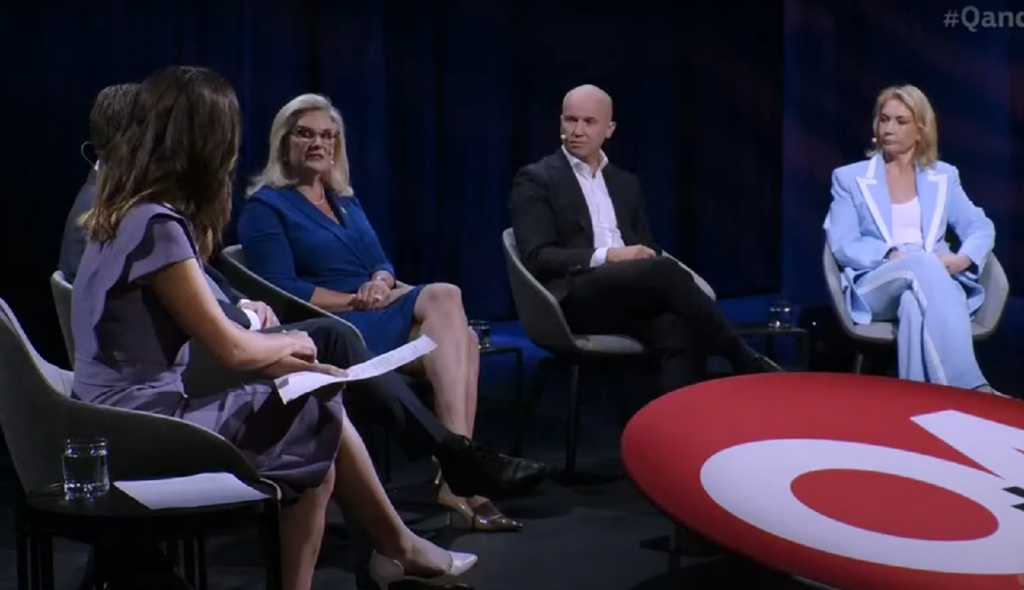Monday’s episode of Q+A neglected a major issue that raises questions on the political and media value placed on disability.
The panel comprised an array of politicians and commentators, including Shadow Assistant Minister for the NDIS Hollie Hughes and Minister for Health Mark Butler.
However, the discussion completely ignored two of the most significant aspects of their respective portfolios. None of the questioners nor host Patricia Karvelas made any inquiries into the welfare of either people with disabilities or with mental health issues.
This raises questions about the agenda ABC sought to set for its flagship program.
Of course, some may argue that panellists could only answer questions brought to them. But it would not have been the first time a Q+A host threw a spanner in the works and started up a debate of their own.
There remain questions around why, when Q+A encourages audiences to either join the audience or send in their questions, not one audience member wanted to ask the Shadow Minister for the NDIS about one of the key issues in her portfolio.
The lack of discussion on disability is even more astounding given the Shadow Minister’s own experiences as a mother of a son with severe autism.
In February, the Shadow Minister said she felt “sick for weeks” and was “nervous” about the outcome of her son’s NDIS review.
Making a speech to parliament (ironically without closed captions or an accessible transcript), Hughes attacked the government’s response to the number of participants in the NDIS and the providers’ behaviour.
“In the midst of a cost-of-living crisis, people, when we know more people with disabilities (who are often on the lower end of the cost of the living spectrum), are being punished by the government”, Hughes said.
The Shadow Minister made no further suggestions as to improving the everyday lives of people with disabilities.
In March, Hughes posted an article published in the Sydney Morning Herald where she was quoted questioning the number of children with severe disabilities in Australia.
“There is no way 9 per cent of children [between ages 5 to 7] have a permanent and lifelong disability”, Hughes said.
She went further to suggest parents should foot the bill for children’s disability needs and that parents were prioritising lifestyle choices and extracurricular activities over the needs of their children.
“Before the NDIS, everyone put their hands in their pockets,” said Hughes.
Given Hughes’ previous admission that her son is an NDIS participant, Q+A host Patricia Karvelas could have asked Hughes whether she was prepared to do the same.
The Liberal Party has released a policy document that appeared to advocate for the individualised supports promoted by the NDIS.
“People living with a disability should have tailored strategies to support their specific needs”, the document stated.
The document argued that the government aimed to provide practical support to help those living with a disability “overcome barriers” and enable them to find and keep employment.
Given the mixed messaging between the Liberal Party’s words and actions and propensity for disabling rhetoric, it is even more questionable as to why nothing on the topic of disability or the NDIS was raised during the Shadow Minister’s time on the Q+A panel.
By further restricting who can be an NDIS provider and restricting the types of support people with disabilities can receive, both the government and the opposition are making NDIS participants more vulnerable and dependent.
That nothing was mentioned at all raises questions about the perception of disability in the media.
With both Hughes and the Minister for Health on the panel, the impact of these comments on current (and potential changes to the NDIS should the Coalition win the next election) should have been addressed.
The disregard for the impact of the erosion of the NDIS and broader disability rights shows both sides of politics do not see disability as an election issue.
That there were no questions from the audience on the topic of the NDIS is interesting, given the Q&A call out for questions the week.
As the election looms, it is clear people with disabilities will continue to be silenced by politicians and media alike.


